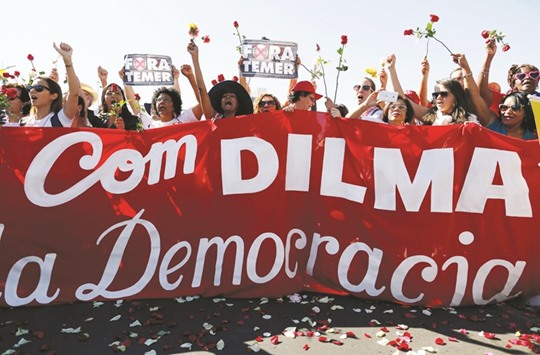Suspended Brazilian President Dilma Rousseff yesterday told senators in emotional testimony at her trial that voting for her impeachment would amount to a “coup d’etat.”
Declaring her innocence and recalling how she was tortured under Brazil’s military dictatorship in the 1970s, Rousseff warned that Latin America’s biggest country was on the verge of losing its democracy.
“Vote against impeachment, vote for democracy.... Do not accept a coup,” the 68-year-old leftist leader said as she defended herself before senators who are widely expected to remove her from office.
Brazil’s first woman president is accused of having taken illegal state loans to patch budget holes in 2014, to mask the country’s problems as it slid into its deepest recession in decades.
Momentum to push her out of office is also fuelled by deep anger at months of political paralysis and a vast corruption scandal centred on state oil giant Petrobras.
All indications point to the Senate convicting Rousseff, ending 13 years of rule by the leftist Workers’ Party.
During questioning that followed Rousseff’s 45-minute speech, pro-impeachment Senator Simone Tebet said that as president, Rousseff had criminally mismanaged Brazil’s accounts by taking the unauthorized loans.
“An unreal Brazil was sold. The unreal numbers led to a loss of confidence among Brazilians and we are facing the worst financial crisis in the history of the country,” Tebet said.
But Rousseff, arguing that the loans were a commonly used fiscal stopgap, said she’d been accused “unjustly and arbitrarily.”
“I’ve come to look your excellencies in the eye to say that I did not commit a crime,” she said in a calm, firm voice from the Senate chamber podium in the capital Brasilia.
There appeared to be little Rousseff could say however to save her presidency.
Closing arguments were to begin after her testimony, followed by voting, possibly extending into tomorrow.
Opponents say they will easily reach the needed two-thirds majority — 54 of 81 senators — to remove her from office.
In that case, Rousseff’s former vice president turned political enemy, Michel Temer, will be confirmed as president until elections in 2018.
Temer, from the centre-right PMDB party, has already been acting president since May, using his brief period in power to steer the government rightward.
Rousseff’s appearance at the trial was the first time she had come face to face with her accusers in the Senate.
Although she spoke mostly in a measured tone, her voice cracked and she appeared close to tears while recalling her suffering as a young leftist guerrilla and in battling cancer.
“Twice I have seen the face of death close up: when I was tortured for days on end, subjected to abuses that make us doubt humanity and the meaning of life itself, and when a serious and extremely painful illness could have cut short my life,” she said.
“Today I only fear for the death of democracy for which many of us here in this chamber fought.”
Supporters, including Workers’ Party founder and ex-president Luiz Inacio Lula da Silva, crammed into the packed Senate chamber.
They ignored warnings to stay silent from Supreme Court Chief Justice Ricardo Lewandowski, who was presiding, bursting into applause and later chanting: “Dilma, warrior of the Brazilian people!”
Criticized for lacking a popular touch or appetite for backroom politicking, Rousseff has barely double digit approval ratings.
Brasilia police said they were preparing for about 10,000 demonstrators yesterday and up to 30,000 during the impeachment vote session.
However, just a few hundred people gathered yesterday outside the Senate to support Rousseff.
“I am fighting to defend democracy and the dignity of the people. This has been a persecution against the Workers’ Party, Dilma and the Brazilian people,” said retired teacher Marlene Bastos, 65.
Most Brazilians have abandoned Rousseff, but there is lingering sympathy for her suffering under the dictatorship.
While her presidency has been mired in the Petrobras embezzlement and bribery scandal, Rousseff herself has never been charged with trying to enrich herself — unlike many of her prominent accusers and close allies.
Temer is hardly more popular, according to opinion polls. He faces harsh questioning over his legitimacy as an unelected president and was loudly booed at the recent Olympic opening ceremony in Rio de Janeiro.

Supporters of suspended President Dilma Rousseff show a banner that reads ‘With Dilma and Democracy’ in front of the Brazilian congress in Brasilia yesterday.
